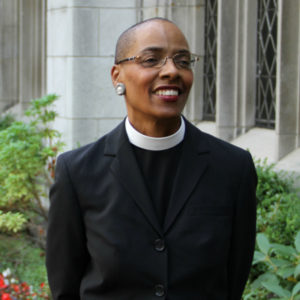A good starting point for understanding what the Bible says about sex is the Bible, an Episcopalian scholar said at three-day discussion of “just” sex arranged by the Alliance of Baptists Oct. 18-20 in Nashville, Tenn.

Kelly Brown Douglas
Kelly Brown Douglas, canon theologian at the Washington National Cathedral recently named inaugural dean of the Episcopal Divinity School at Union Theological Seminary in New York City, said many Christians today unknowingly rely on “an authoritative interpretation” of the Bible when dealing with issues like same-sex marriage.
“We have to become very aware of the fact that there is a tradition of interpretation that has more authority than in fact the Bible itself,” said Douglas, a leading expert in the field of womanist theology, racial reconciliation and sexuality and the black church.
“I think that we need to open up the text and make people aware of what is there and what is not there,” she said during a brief question-and-answer exchange following Friday’s lecture. “It’s always amazing to me how people espouse what God says in the Bible about quote-unquote homosexuality and it’s like: ‘Really? Where do you find that? That’s not there.’”
In the lecture, Douglas said scorn and disregard for sexuality found in Christianity today are rooted in dualistic views pitting body against soul that influenced writings of the Apostle Paul and reinforced by later interpretation of those writings in both Catholic and Protestant traditions.
“While Paul’s sexual ethic was more disavowing of the body sexual than was perhaps warranted by Jesus’ teaching, one must always bear in mind that Paul was responding to the concerns of particular congregations,” she said.
“Accordingly, his sexual ethic was appropriate, perhaps, to the issues at hand,” she added. “In that regard, to use Paul’s sexual ethic as a sexual ethic that should govern our times is really to misuse” those teachings.
Douglas said no one relied more on Paul’s writings — or had a more significant impact on Christian theology — than the fourth century saint, Augustine of Hippo.
“Augustine affixed a certain reading of Paul for generations of later readers, thus allowing his own imprint on Christian sexuality to be virtually unsurpassed,” she said. “Augustine was indeed the major conduit, I believe, of a sort of body-antagonistic, sexual-denying ethic into our western Christian tradition.”
Douglas said Augustine’s reading of Paul was rooted in his own struggle to control his own sexual desire. Believing he was controlled by his lusts, she said, Augustine “exaggerated and I think in some ways distorted” Paul by unambiguously pronouncing sex as sinful.
“This is an ethic that suggests that there are only two ways in which to engage sexual activity. One is tolerable and not inherently sinful, and the other is intolerable and sinful.”
“This is an ethic that suggests that there are only two ways in which to engage sexual activity,” she said. “One is tolerable and not inherently sinful, and the other is intolerable and sinful. Procreative use is tolerable and non-procreative use is intolerable and evil.”
Such a dualistic ethic, she said, leaves no place for a “third possibility” allowing for “sexual intimacy as an expression of human love.”
Douglas called for a new sexual ethic that does not begin with “just say no” to sex.
“When sexuality is expressed in a way that provides and nurtures harmonious right relationship — that is those that are loving just and equal — then it can be considered sacred,” she said. “It is only when sexual expression is objectified and thus disconnected from harmonious right relationship, loving relationship, it is only then that it is sinful.”
“The measure of what is sinful has to do with whether or not it contributes to right, harmonious relationship,” she said. “It does not have to do with the gendered realities or anything else of who is involved in a particular relationship. Indeed regardless of the gendered realities of relationship, we must always ask the question whether or not we are talking about right, loving relationships of mutuality and reciprocity. It is that which we should focus upon, not focusing upon who and who is not involved in the relationship.”
The JUST SEX Conference, held at Scarritt Bennett Center, included worship, Bible study and breakout sessions to explore topics including how understandings of sexuality change over time and how faith communities can respond to those changes, as well as principles toward a contemporary sexual ethic reclaiming sex as a gift from God.
